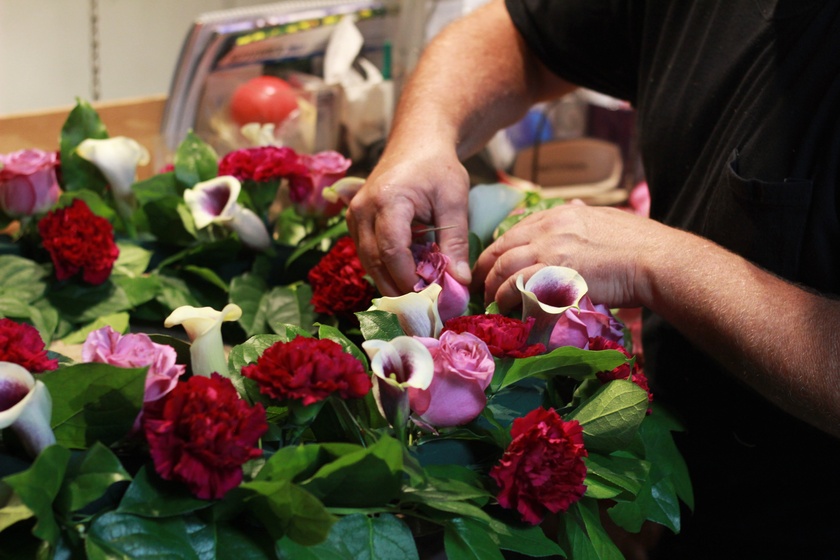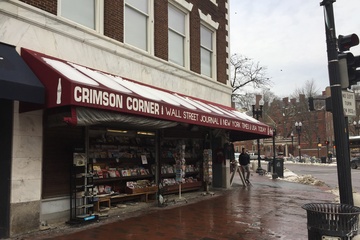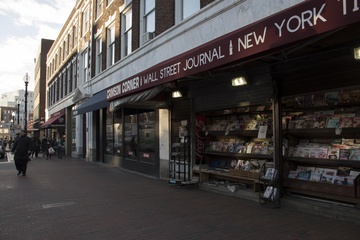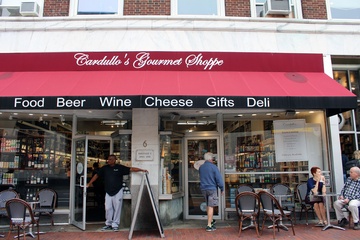Randy Ricker, owner of Brattle Square Florist, clearly remembers his first Valentine’s Day in the shop. The store had more than 400 orders to be delivered to lovers across Cambridge, and no digital organizational system in place whatsoever. “Brattle Square Florist is run like it’s 1930,” Ricker says. Ricker is hardly exaggerating—he uses a computer for billing, but he and his staff write all other pertinent information on slips of paper that are tacked on a wall following some indistinguishable system of organization. The shop does have a “Rolodex,” as Ricker jokingly dubs a section of wall covered with business cards and phone numbers.
Ricker was doubtful that the shop would be able to handle the Valentine’s Day rush, but the shop’s haphazard system was up to the task, as it has been since 1917. He soon let go of any reservations he had about the shop’s analog operations. “I would wager a large sum of money that we have fewer errors than most modernly run shops,” Ricker says.
Brattle Square Florist shows few signs of changing with the times. It’s had 100 years to perfect its operations. The shop was originally run by three Greek brothers who cycled through a series of storefronts: produce, ice cream, and ultimately, the flower shop. For three generations, the business remained in the family, until it was sold to Ricker in early 2013.
When Ricker left his 20-year career in corporate staffing and recruiting five years ago to buy a business, he had a certain set of criteria: the business had to be well-established, with a small number of employees. In the case of the flower shop, that staff also needed to be full of “people who knew flowers, because I didn’t,” Ricker says with a laugh.
Though Ricker had to learn on the job, Brattle Square had no shortage of floral experts. The shop was previously run by Stephen Zedros, a third-generation Brattle florist who still works in the shop and has become something of a “legend of Harvard Square,” says Ricker. Zedros’ expertise, along with that of the other longtime employees of Brattle Square Florist, allowed Ricker to grow his knowledge of flowers and plants. “When you’re thrown in the water you learn how to swim,” Ricker says. After five years on the job he feels “90 percent [able] to handle anything that comes in.”
Perhaps that’s not surprising given the shop’s wide selection. The long and narrow space is chock-full of flowers sold by the stem and bundled in bouquets alongside a wide variety of potted plants. An impressive array of succulents is displayed near the store’s entrance; “they’re super trendy,” Ricker says, and they have “a great shelf life” which is essential in the plant business. “A lot of plants die on our watch,” Ricker says, due to the wide variety of water and sunlight requirements, so he likes “plants that hang tough.” In corners of the store, employees delicately arrange elegant floral centerpieces for weddings.
The flowers that Brattle sells come from all over the world. Before they get to Cambridge, though, they usually make a stop in Miami. Trucks then make the long haul up the east coast so that thousands of flowers can be delivered to the shop every morning. Initially, the stems lie lifeless, packed dozens to a box, but after the staff “gives them a drink,” as Ricker says, the flowers perk right up and are mixed into the storefront’s vibrant display.
The shop is an old-fashioned stronghold in Harvard Square’s tumultuous real estate environment. A number of buildings stretching along Brattle Street are up for sale by the family trust that owns them. If sold, that neighborhood of Harvard Square could change radically. Ricker emphasized that Cambridge’s zoning laws could allow the cozy storefronts to be turned into multi-story buildings.
Ricker says he doesn’t dwell too much on that possibility because he “can’t do anything about it.” Nestled in a rapidly-changing Harvard Square, Brattle Square Florist keeps a “multigenerational” clientele, Ricker says. There is no typical customer; patrons range “from the ritziest Brattle Street customers to a poor student who just needs a couple flowers in her dorm room,” Ricker says.
Kids, in particular, are captivated by the colorful array of plants and flowers. The shop’s youngest customers “get excited about coming into the store, and that carries through for their entire lives,” Ricker says. “It’s definitely part of the community.”







